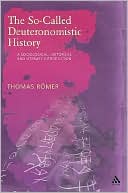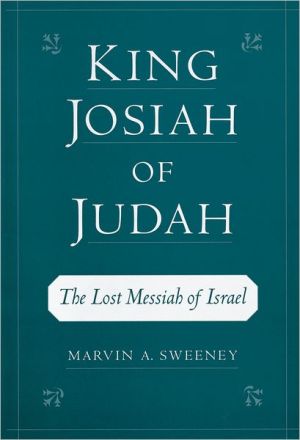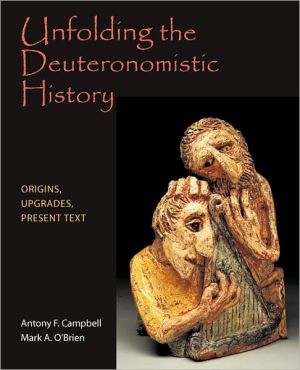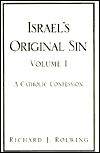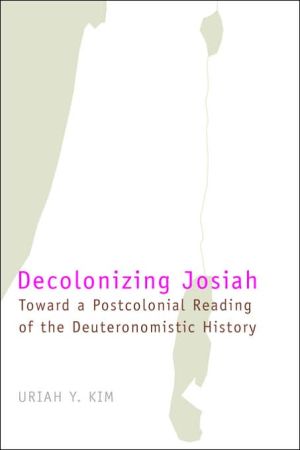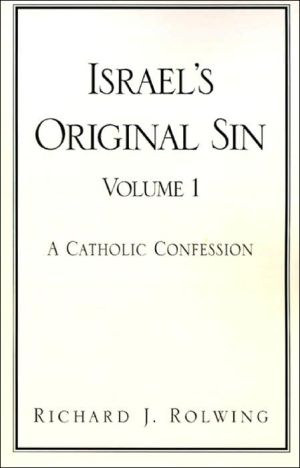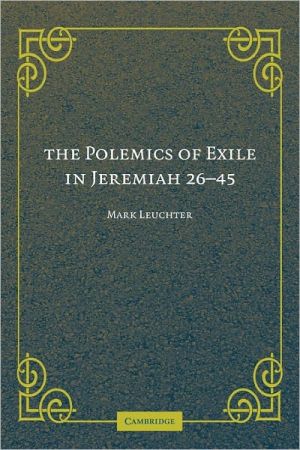So Called Deuteronomistic History
Search in google:
About the Author:Thomas Romer is Professor of Hebrew Bible in the Faculty of Theology at the University of Lausanne and Chair of the Deuteronomistic History Group of the Society of Biblical Literature
List of abbreviations ixIntroduction 1The Content of the So-called Deuteronomistic History (Deuteronomy-2 Kings) 3Deuteronomy 3Joshua 4Judges 6Samuel-Kings 8What Does 'Deuteronomistic History' Mean? A Survey of Past Research 13The Prehistory of the Deuteronomistic History Hypothesis 14The First Steps towards the Idea of a 'Deuteronomistic History' 14The Discovery of 'Deuteronomism' 16The Elaboration of the Idea of Deuteronomic Editors 17The Elaboration of the Deuteronomistic History Hypothesis by M. Noth 21The Origins of Noth's Thesis 21The Uberlieferungsgeschichtliche Studien 22First Reactions to Noth's Model 26Major Modifications and Criticisms of the Deuteronomistic History Hypothesis 27Frank Moore Cross and the Double Redaction of the Deuteronomistic History 27Rudolf Smend and the Multiple Exilic Redactions of the Deuteronomistic History 29The 'Neo-Nothians' 31The Deuteronomistic History and Other Deuteronomistic Redactions 33Recent Criticisms of the Deuteronomistic History Hypothesis 35Deuteronomistic History and Historiography 36Do the Books from Deuteronomy to Kings Reveal a Coherent Deuteronomistic Redaction? 38The Present State of Discussion: A Time for Compromise? 41The Deuteronomistic History from the Assyrian to the Persian Period 45Who Were the 'Deuteronomists'? 45The Foundation Myth of the Deuteronomistic School in 2 Kgs 22-23: Book-finding and Cultic Reform 49The Three Different Viewpoints about Centralization in Deut. 12 as an Example of the Threefold Edition of the Deuteronomistic History 56Deut. 12.13-18: Practical Consequences of the Centralization at the End of the Seventh Century BCE 58Deut. 12.8-12: An Exilic Reinterpretation of the Concept of Centralization 61Deut. 12.2-7: Cult Centralization and the Rejection of 'Illegitimate' Cults in the Persian Period 63The Three Editions of Deut. 12 and Scribal Activity in the Deuteronomistic History 64Deuteronomistic Editing in the Assyrian Period and Royal Propaganda 67The Beginning of Deuteronomistic Literary Production in the Seventh Century BCE 67The First Edition of Deuteronomy in the Assyrian Period 73Deuteronomy and Assyrian Treaty Literature 74Content, Concerns and Ideology of the First Edition of Deuteronomy 78Political and Military Propaganda in the Book of Joshua 81The Problem of Composition in Joshua 82Neo-Assyrian Conquest Accounts and their Significance for the First Edition of Joshua 83The Function of the First Conquest Account in Josiah's Time (Josh. 5-12) 86Judges, Samuel and Kings 90The Book of Judges 90The Books of Samuel 91The Books of Kings 97Summary: The Origins of the Deuteronomistic Library in the Neo-Assyrian Period 104The Constitution of the Deuteronomistic History in the Neo-Babylonian Period 107Setting the So-called 'Exilic Period' 107From Josiah to Exile 107The Invention of the 'Exilic Period' 109The Concept of Crisis Literature 111The Structure and Ideology of the Deuteronomistic History's Exilic Edition 115The Exilic Edition of the Deuteronomistic History 123The Book of Deuteronomy: The Reader's Guide to the History 123The Literary Fiction of Deuteronomy 124The Construction of Israel's Origins in Deut. 1-3 124The References to the 'Fathers' and the Exodic Origin Myth 126Deut. 5 and the Organization of the Law 127From the Conquest of the Land to the Conquest of the Law: Reinterpreting Joshua 133The Invention of a Period of Judges (Judg. 2.6ff-1 Sam. 12) 136The Deuteronomistic Editing of Judges 137The Deuteronomistic Attitude to Monarchy (Deut. 17.14-20 and 1 Sam. 8-12) 139The Ark Narrative in 1 Sam. 4-6 (and 2 Sam. 6) 144The Foundation of the Dynasty and the Foundation of the Temple (1 Sam. 12-1 Kgs 8) 145The Story of the Two Kingdoms (1 Kgs 9-2 Kgs 17) 149Solomon and the Crisis of Monarchy 149Prophets and Kings 152The Northern Kings 155The Southern Kings (from Rehoboam to Ahaz) 157Cultic Reforms and the End of Judah (2 Kgs 18-25) 158Summary: The Exilic Edition of the Deuteronomistic History 163Editing the Deuteronomistic History during the Persian Period 165Social and Political Context in Judah during the Persian Period 165The Main Themes of the Persian Edition of the Deuteronomistic History 169Segregational Revision in Deuteronomy to Judges 170From Monolatry to Monotheism 172Golah and Diaspora 175The Death of the Deuteronomistic History and the Birth of the Torah 178Index of Passages Cited 185Index of Authors 199
